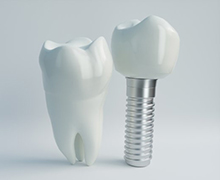Dental Implants – Plano, TX
We Can Permanently Replace Your Missing Teeth
When you lose a tooth, it’s important to have it replaced as soon as possible. Even just one missing tooth can create a myriad of other dental complications, not to mention the impact it can have on a beautiful smile! Dr. Sam Antoon of Antoon Family Dental offers convenient and compassionate care for Plano patients and can help you fully recover your appearance with dental implant services. Call us today to schedule an appointment or to learn more about dental implants in Plano.
Why Choose Antoon Family Dental for Dental Implants?
- Works Closely with Local Dental Implant Specialists
- Dentist with 30+ Years of Experience
- In-Office Financing Options Available
What Are Dental Implants?

A dental implant is a titanium post that is surgically inserted beneath your gums, where it takes the place of a missing tooth’s root. After the surgery, metal connectors called abutments are placed on top, allowing them to secure your custom-made replacement teeth in place. A single implant can support a dental crown, while two or more implants can be used to support a bridge or a denture.
By replacing the missing tooth’s root as well as its visible crown, dental implants provide a truly comprehensive solution to tooth loss. They eventually fuse with your jawbone, essentially making your body think that your implant is one of your actual teeth. This allows them to not only look and feel more natural than any other solution, but also last several times longer.
The 4-Step Dental Implant Process

The dental implant process requires multiple steps and takes several months, but this high-quality solution is definitely worth the wait. Every patient’s journey looks a bit different, but here are the basic four steps of the process:
- Initial dental implant consultation – Dr. Antoon examines your mouth, comes up with a personalized treatment plan, and takes care of any preparatory procedures you may need, such as bone grafting or gum disease therapy.
- Dental implant surgery – Your gum tissue is opened, and each implant post is placed with extreme precision.
- Dental implant osseointegration/abutment -- During a recovery period of four to eight months, the jawbone grows around the implant in a process called osseointegration. After this process is complete, the dental implants are exposed, and abutments attached.
- Delivery of dental implant restorations -- After one more brief healing period, you’ll return to our office to have Dr. Antoon affix your crown, bridge, or denture.
Initial Dental Implant Consultation

During your initial consultation with Dr. Antoon, he will evaluate your oral health and be on the lookout for signs of any issues such as gum disease. This is also a great time to discuss any questions or concerns you may have about the procedure and talk about what you’d like to achieve.
After an X-ray and an oral inspection to determine that you have proper jawbone density and are a good candidate for the procedure, he will develop a treatment plan unique to your smile. If you do have any oral health issues, there’s no need to worry, you may just have to account for additional procedures in your timeline.
Dental Implant Surgery

After your consultation, you may need preparatory surgeries such as bone grafting to make sure that your implants are successful. The length of healing will vary from patient to patient, but typically, bone grafting takes about four to six months to heal.
Once your jawbone has healed, your implants can then be placed. Your oral surgeon will make small incisions in your gum to place your titanium implants that will serve as the roots of your missing teeth. They will be placed into the bone so they can fuse and provide a strong and stable foundation for your restorations through a process called osseointegration. You will still have gaps where your teeth are missing until your gums are healed and your abutments can be placed.
Dental Implant Osseointegration/Abutment

Four to six months of healing time is necessary after your implants are placed because through the process of osseointegration, your restorations will be able to function and feel like your natural teeth and unite with your jawbone. Once it’s complete, you may need another minor surgery to place the piece that will connect your restorations to your implants, called the abutment. After that's done, your gums will need to heal for another couple of weeks before your custom restorations are connected.
Delivery of Dental Implant Restorations

Once your gums are healed, Dr. Antoon will take impressions of your mouth to send off to a dental lab to have your custom-fitted restorations made. After they arrive, your crown, bridge, or dentures will be placed on top of your abutments.
With so many factors that go into your individual dental implant timeline, the best way to learn how your unique process will go is by scheduling a consultation with your dentist in Plano. Dr. Antoon and our team are more than happy to answer any questions you may have and help you start your journey towards a happier and healthier smile. To schedule a consultation today, all you need to do is contact us!
Benefits of Dental Implants

When it comes to replacing teeth, whether it’s just one tooth or an entire arch, restoring the tooth above and below the gumline makes a world of difference. Dental implants are truly the next best thing to natural teeth. Since they integrate with your jawbone without relying on the remaining teeth or gums for support, they’re designed to feel and function just like the tooth or teeth that you lost. In fact, dental implants offer a wide variety of benefits for your health, confidence, and quality of life that you simply can’t achieve with other tooth replacement options! Read on to learn more about some of the most popular reasons why our patients love dental implants.
Day-to-Day Benefits

- Eat whatever you like comfortably and easily: Dentures and dental bridges restore only a fraction of a patient’s chewing ability, with dentures only providing about 25-30% biting power. Dental implants restore 75% or more chewing force, allowing you to easily and comfortably eat apples, steaks, nuts, and anything else on your plate.
- Dramatically improved comfort and stability: Because dental implants are firmly rooted in your jawbone like natural teeth, they’re more comfortable than any other option. They won’t cause tooth sensitivity, gum irritation, or jaw soreness like prolonged use of dental bridges or dentures can. In fact, dental implants are so comfortable and natural-feeling that you may even eventually forget that you have them!
- Unmatched confidence in your new smile: Your dental implants will never shift, slip, pop, click, or feel loose as you go about your day. Instead, you’ll be free to talk, laugh, and chew in public and social gatherings in complete confidence without worrying about an unstable smile.
Health Benefits

- Stop jawbone deterioration and preserve your appearance: Dental implants are the only tooth replacement option with the ability to stop jawbone deterioration after tooth loss. They stimulate circulation in the bone tissue to keep it strong and healthy, which prevents the sunken, aged facial appearance that typically accompanies missing teeth.
- Prevent future tooth loss and oral health problems: Maintaining a strong jawbone with dental implants will help keep your remaining natural teeth firmly rooted in place as well. Plus, dental implants are easy to clean, stop dental drift, and promote better oral health, which dramatically lowers your risk of future oral health problems like cavities and gum disease.
Long-Term Benefits

- The longest-lasting tooth replacement: Dental implants can last for decades, and many patients can expect to enjoy them for the rest of their life with the proper care. This is much longer than other tooth replacement options like dentures and dental bridges, which need to be replaced every five to seven years.
- Save thousands of dollars in repairs and replacements: While dental implants have a higher upfront cost than dentures or dental bridges, they can easily become the more cost-effective option over time. While other tooth replacement options will need to be repaired, realigned, and replaced every few years, dental implants have the potential to last you a lifetime. You can potentially save thousands of dollars on replacements alone, not to mention no extra expenses for pastes or cleaning products and lowered oral healthcare costs.
Who Dental Implants Can Help

Tooth loss can cause degeneration of the jawbone, which raises the risk of losing even more teeth. But, by choosing this comprehensive replacement option, you are helping to ensure your jawbone stays healthy and whole — thereby reducing the risk of further tooth loss, keeping your smile intact for years to come. We can use dental implants to replace one tooth, multiple teeth, or a whole row of your smile.
Missing One Tooth
An implant-retained crown takes the place of a single missing tooth. It is fixed to the jaw and cannot be removed for cleaning or while you sleep. We will mount a custom-made dental crown to your dental implant, seamlessly completing your smile.
Missing Multiple Teeth
The bridge is a set of two or more teeth that replaces consecutively missing teeth. We can use dental implants on either side of your dental bridge to anchor it in place for a beautiful and functional restoration. This option gets its name because it literally “bridges” the gap in your smile.
Missing All Teeth
If you’re missing all or most of your teeth, we use an implant denture to replace your whole smile with the support of dental implants. Now, you can receive the best of both worlds with a healthy, functional, and beautiful set of teeth.
Learn More About Implant DenturesLearn More About All-On-4 Dental Implants
Understanding the Cost of Dental Implants

One of the biggest concerns that patients have before getting started with their dental implant tooth replacement plan is the price. The cost of your dental implants may come with an initially higher price tag, but the long-term results make it well worth the investment. During your treatment planning process, we’ll explain the costs associated with every step of your procedure, including the placement of dental implant posts, completion of preparatory treatments, and the attachment of custom replacement teeth.
Types of Dental Implants

The majority of the cost of dental implant tooth replacement comes from the price of the custom crafted dental implants and their surgical positioning. Your dental implants will be custom made from high quality materials. In most cases, dental implants are crafted from titanium or zirconia. Once these implant posts are crafted, they still need to be surgically placed. The creation of custom implant posts and their surgical placement will likely make up the majority of your treatment cost, but this is only one step in a multi-phase process.
What Should I Budget For?

In addition to budgeting for the cost of dental implant posts and their surgical placement, your multi-step treatment plan may also include the following treatments that will affect pricing:
- Preparatory procedures like tooth extractions and bone tissue grafts that may be necessary to ensure successful dental implant placement.
- To hold the replacement teeth to implant posts, we will typically need to attach abutment posts.
- Replacement teeth, including dental crowns, bridges, partials, or full dentures will be crafted to fully restore the smile.
- Dental sedation may also be used throughout the process to ensure comfort, safety, and relaxation.
Why Do Dental Implants Cost So Much?

While dental implant tooth replacement does come with a higher price tag than some other restoration options, it’s important to keep in mind that, unlike these other restorations, implant supported tooth replacement remains in place for decades and functions much more like healthy, natural teeth. The multi-phase process does come at a cost, but the long-term results are well worth the added investment.
Does Dental Insurance Cover Dental Implants?

Dental insurance providers want patients and dentists to utilize treatment options that cost the least amount of money. As dental implants continue to prove themselves to be the best long-term solution to tooth loss, more insurers are offering some coverage for these treatments. Unfortunately, the majority of providers still don’t offer coverage for dental implants or their placement. Other parts of the treatment process, including preparatory procedures and replacement teeth, will receive some coverage. Our team members are experts when it comes to making the most of your available benefits and helping you to budget for your total treatment plan. We also partner with third-party financiers to offer low or no interest financing plans to help you spread the cost of care into several smaller payments.
Dental Implant FAQs

Making the decision to restore your smile and replace missing teeth can be overwhelming. Especially if you have a list of questions that you’d like answered before you commit to scheduling a consultation. At Antoon Family Dental, we want you to feel confident getting dental implants in Plano, which is why we’ve compiled some questions that we frequently get from our patients below.
How long do dental implants last?
Your dentist in Plano, Dr. Antoon, utilizes the most advanced technology in the dental field for added precision of placement and success. Dental implants boast a 95 percent success rate, and with the proper care and treatment, they can last over 25 years.
When you keep up with your hygiene routine, you can keep your oral health in great shape, increasing your implant lifespan. Additionally, when you visit Antoon Family Dental for your semi-annual checkups and cleanings, we’ll be able to check the condition of your restorations and be proactive if you need any treatments.
Does getting dental implants hurt?
At Antoon Family Dental, we offer several sedation techniques and use the latest technology to help make your procedure as pain-free as possible. After your implants have been surgically placed, you will experience some discomfort as your gums heal. Luckily, it’s nothing that can’t be managed with over-the-counter pain medications. In fact, most patients report that they’re able to return to work the very next day!
Do my dental implants require special care?
One of the best benefits of dental implants is that they’re the closest solution to your natural teeth, meaning that they’ll be just as easy to take care of. Be sure to brush, floss, rinse with an antibacterial mouthwash, and visit Dr. Antoon for your professional cleaning and checkup every six months. Other than that, you can enjoy your new implants, hassle-free.
How will I know if I need bone grafting?
When you visit Dr. Antoon for your initial consultation, he’ll examine your mouth and capture images of your face. With these, he’ll be able to determine whether or not you’ll need preparatory procedures such as bone grafting. This is usually needed because when a tooth is missing for a long period of time, it can result in jawbone deterioration.
How long will it be before the dental implant process is completed?
Every patient’s mouth is different, which means that every treatment timeline varies drastically as well. Depending on factors like whether or not you need bone grafting, where your implant is located, what kind of restoration you need, and how many implants you need to be placed, the process can last several months. There’s no need to worry though, dental implants come so highly recommended because they offer a variety of benefits that traditional restorative options can’t. In fact, most patients will agree that the investment of time is well worth the improved quality of life they have afterward!
How successful are dental implants?
When placed by a skilled professional, dental implants have a very high success rate of over 95%. The success of your implants will depend on how well you care for them when it comes to oral hygiene, routine checkups, and a healthy diet. Success can also be based on the location of the dental implant in your mouth. Since molars tend to receive more strain in the mouth when chewing than the front teeth, they are slightly more likely to fail.
Will I have to take off work for dental implant surgery?
Most patients only need to take a day or two off work in order to have dental implants placed, but every case is different. If your job is physically demanding, you may want to take at least three or four days off, as heavy exercise can divert blood from the implant site and delay healing. Dr. Antoon will be able to give you a more specific recommendation based off of your unique case.
Can I get dental implants if I’m diabetic?
If your diabetes is under control, your odds of dental implant success are generally comparable to those of nondiabetic patients. Uncontrolled diabetes can slow down the healing process and make it more difficult for your implants to completely integrate with your jawbone. If you’re looking to get dental implants, talk to your endocrinologist or primary care physician about getting your blood sugar levels under control before moving forward in the process.
Do dental implants decay?
No, dental implants are not made from tooth enamel, so they are unable to get cavities. However, your surrounding teeth can still experience decay and your gums are able to become infected. Because of this, oral hygiene is just as important after your dental implant placement surgery as it was before.
Maintaining & Caring for Your Dental Implants

If you’ve made the choice to replace your missing teeth with dental implants, it’s time to protect your investment. Your new smile can last for several decades if you take the time to practice excellent dental implant care in Plano. With the right maintenance, you should never need to worry about having to get your new teeth replaced. To ensure your dental implants thrive, here are five important tips to follow.
Make Oral Hygiene a Priority

Although dental implants aren’t subject to tooth decay, you still need to take the time each day clean them. The biggest threat to the longevity of your new smile is a preventable gum infection called peri-implantitis. It results from bacteria found in plaque accumulations.
You can easily prevent infection by brushing your (real and natural) teeth twice a day with a soft-bristled toothbrush and nonabrasive toothpaste. Take the time to clean between any natural teeth and around the abutments using a high-quality dental floss. If you find it difficult to clean these hard-to-reach places, ask your implant dentist in Plano about products that can help, such as a water flosser.
Eat a Healthy Diet

Traditional dentures limit your ability to chew nutritious foods like fresh fruits and tough meats. With dental implants, you can eat virtually anything you want. Be sure to incorporate a variety of healthy foods, like vegetables, that contain vitamins and minerals that promote excellent gum health.
Also, limit your indulgence in sugary foods and beverages. Sugar particles in your mouth give bacteria the fuel to wreak havoc on your gums.
Break Bad Habits

Juts because your new teeth are made of titanium doesn’t mean they’re indestructible. Harmful oral habits like chewing on pens or pencils, opening bottles or packaging with your teeth, and biting your nails can spell disaster for your dental implants. Additionally, you should quit using any tobacco products before your dental implant surgery. Not only can tobacco inhibit the osseointegration process, but it also more than doubles your risk for gum disease.
Protect Your Dental Implants

It’s best to wear an athletic mouthguard if you play sports. This device creates a protective barrier between your oral structures and the force of the trauma. It can prevent your implants and remaining teeth from getting broken, chipped, or knocked-out.
Bruxism can also compromise the success of your dental implants in Plano. The pressure from grinding and clenching can cause your implants to become loose and fall out. The force can also wear down your restorations and remaining enamel. Dr. Antoon can make you a custom nightguard to provide cushioning between your upper and lower teeth.
Schedule Regular Dental Checkups

You’ll also want to visit our dental office at least twice a year for a cleaning and checkup. Dr. Antoon will examine your dental implants for any signs of complications, such as inflammation. Quick detection allows him to treat the problem while it’s still small to prevent the issue from worsening and leading to implant failure.
If a concern develops in between your semi-annual appointments, like pain or a feeling that the implant is loose, don’t wait until your next visit. Contact our office right away.
Dental Implant Failure & Salvage

Dental implants have an incredible success rate that is over 95%! However, there is still a very rare chance of experiencing a dental implant failure. If your newly restored smile is starting to feel uncomfortable or you are concerned about the wellbeing of your dental implants, don’t hesitate to reach out to us. We might be able to restore your dental implant with dental implant salvage treatment.
Learn More About Dental Implant Failure & Salvage



